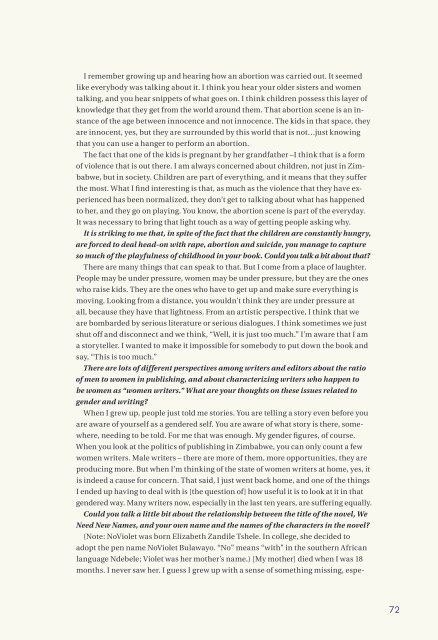magazine_final_online
You also want an ePaper? Increase the reach of your titles
YUMPU automatically turns print PDFs into web optimized ePapers that Google loves.
I remember growing up and hearing how an abortion was carried out. It seemed<br />
like everybody was talking about it. I think you hear your older sisters and women<br />
talking, and you hear snippets of what goes on. I think children possess this layer of<br />
knowledge that they get from the world around them. That abortion scene is an instance<br />
of the age between innocence and not innocence. The kids in that space, they<br />
are innocent, yes, but they are surrounded by this world that is not…just knowing<br />
that you can use a hanger to perform an abortion.<br />
The fact that one of the kids is pregnant by her grandfather –I think that is a form<br />
of violence that is out there. I am always concerned about children, not just in Zimbabwe,<br />
but in society. Children are part of everything, and it means that they suffer<br />
the most. What I find interesting is that, as much as the violence that they have experienced<br />
has been normalized, they don’t get to talking about what has happened<br />
to her, and they go on playing. You know, the abortion scene is part of the everyday.<br />
It was necessary to bring that light touch as a way of getting people asking why.<br />
It is striking to me that, in spite of the fact that the children are constantly hungry,<br />
are forced to deal head-on with rape, abortion and suicide, you manage to capture<br />
so much of the playfulness of childhood in your book. Could you talk a bit about that?<br />
There are many things that can speak to that. But I come from a place of laughter.<br />
People may be under pressure, women may be under pressure, but they are the ones<br />
who raise kids. They are the ones who have to get up and make sure everything is<br />
moving. Looking from a distance, you wouldn’t think they are under pressure at<br />
all, because they have that lightness. From an artistic perspective, I think that we<br />
are bombarded by serious literature or serious dialogues. I think sometimes we just<br />
shut off and disconnect and we think, “Well, it is just too much.” I’m aware that I am<br />
a storyteller. I wanted to make it impossible for somebody to put down the book and<br />
say, “This is too much.”<br />
There are lots of different perspectives among writers and editors about the ratio<br />
of men to women in publishing, and about characterizing writers who happen to<br />
be women as “women writers.” What are your thoughts on these issues related to<br />
gender and writing?<br />
When I grew up, people just told me stories. You are telling a story even before you<br />
are aware of yourself as a gendered self. You are aware of what story is there, somewhere,<br />
needing to be told. For me that was enough. My gender figures, of course.<br />
When you look at the politics of publishing in Zimbabwe, you can only count a few<br />
women writers. Male writers – there are more of them, more opportunities, they are<br />
producing more. But when I’m thinking of the state of women writers at home, yes, it<br />
is indeed a cause for concern. That said, I just went back home, and one of the things<br />
I ended up having to deal with is [the question of] how useful it is to look at it in that<br />
gendered way. Many writers now, especially in the last ten years, are suffering equally.<br />
Could you talk a little bit about the relationship between the title of the novel, We<br />
Need New Names, and your own name and the names of the characters in the novel?<br />
(Note: NoViolet was born Elizabeth Zandile Tshele. In college, she decided to<br />
adopt the pen name NoViolet Bulawayo. “No” means “with” in the southern African<br />
language Ndebele; Violet was her mother’s name.) [My mother] died when I was 18<br />
months. I never saw her. I guess I grew up with a sense of something missing, espe-<br />
72


